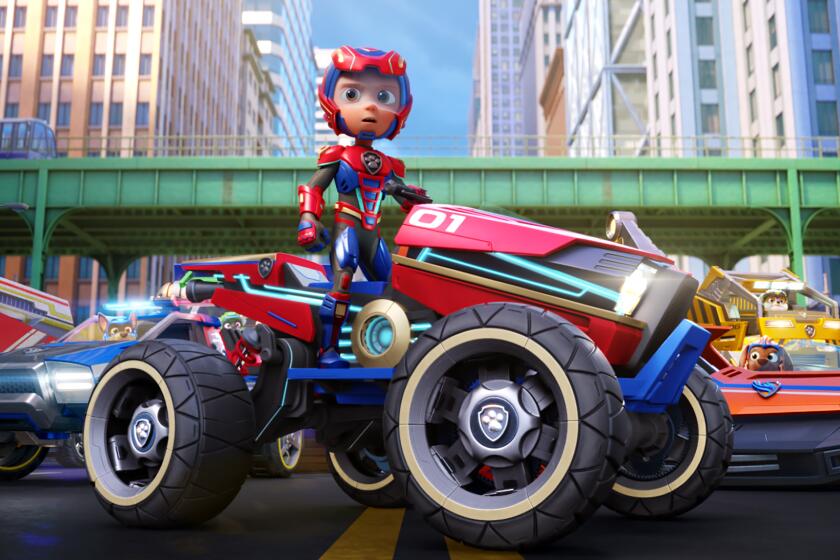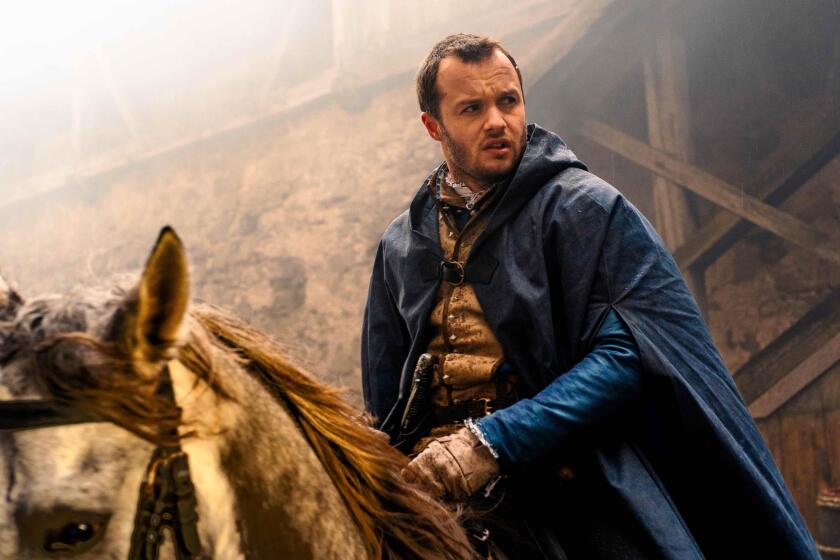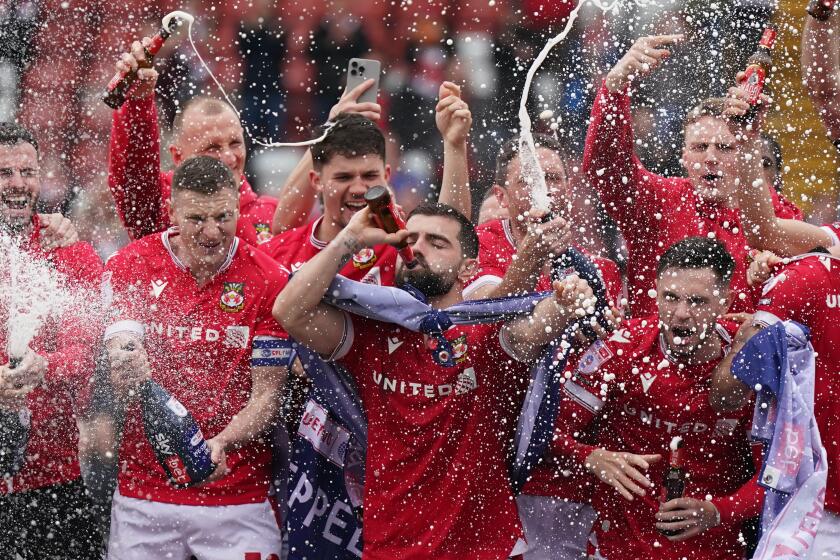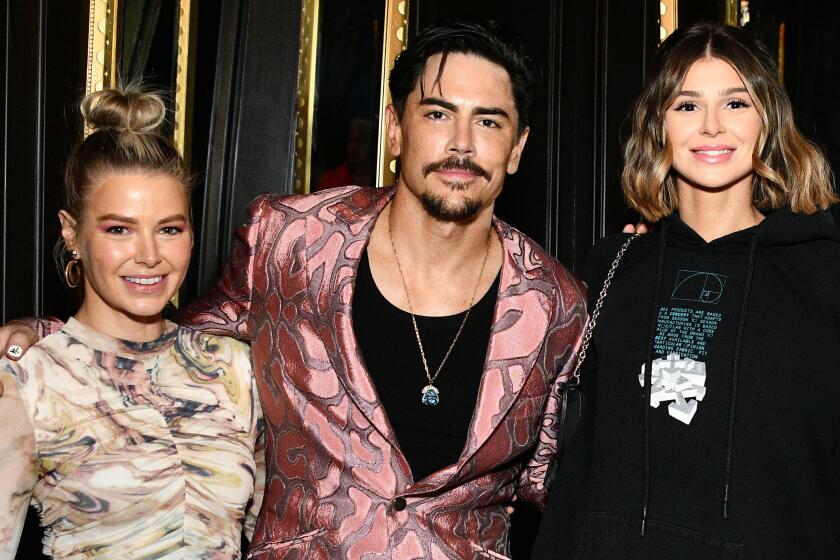Humor is down to a science
It makes absolute sense that the folks at the Apple store Genius Bar would freak out at the sight of the cast of “The Big Bang Theory.” Or that thousands of fans would fill a room to spend time with them at Comic-Con last summer. But when the paparazzi of Mexico City went so berserk over the five actors during a promotional visit in December that they required an armed bodyguard, the young cast knew their little sitcom was turning into a sensation.
Statistically, “Big Bang” is defying all kinds of odds, most notably in that it’s thriving at a time when the multi-camera format has been declared dead and network television as a whole is struggling. In its sophomore season, the buddy comedy has registered 20% more viewers, reaching the 10 million mark, and building enough confidence at CBS that it’s been renewed for two more years.
At its core, “Big Bang” is a show about brainy best friends, genius nerds and social misfits who for the first time on TV are the source of the joke, not the butt of it. But on a deeper level, it’s also about love, loyalty, friendship and the frailties of the human spirit mixed in with quantum physics and superhero fanboydom. Think “Weird Science” meets “Friends.”
Behind the scenes, the show is even more like “Friends.” The “Big Bang” cast has gelled personally in a way that is rare on television and is reminiscent of Jennifer Aniston and the gang, a group that stuck together even during contract negotiations. It may be too early for the “Big Bang” actors to be landing million-dollar-per-episode deals, but their close relationships and on-camera chemistry are highly in their favor.
“You don’t have to be friends with your colleagues,” said Johnny Galecki, who plays Leonard, the heart of the show, and the most recognizable actor of the group when it premiered, primarily from his work on “Roseanne.” “But it all happened very naturally. The good thing is we allow ourselves our bad moods and dark days. There’s no expectation to be buddy-buddy either. We’re all kind of bracing for the day when we disappoint each other, anger each other, or get under someone’s skin because so far we’ve just had so much fun.”
How much fun? The “Big Bang” gang works Monday through Friday, has at least two dinners a week together, and has vacationed together. They meet for drinks, play Scrabble, “and we know everything about each other, and that’s good and bad,” said Kaley Cuoco, who plays Penny, the actress-waitress who lives next door to the genius physicists, Leonard and Sheldon (Jim Parsons).
“It’s one of the luckiest things,” said Simon Helberg, who plays Howard Wolowitz, an engineer who fancies himself a Casanova. “We have a shorthand with each other. There’s no tension. There’s just honesty, and it doesn’t feel competitive.”
If they were a family, Galecki and Parsons would be the parents, Helberg the protective older brother, Kunal Nayyar the picked-on middle child and Cuoco would be the smart-aleck little sister who gives them hair styling tips before a Times photo shoot.
“It was so cute,” Cuoco said. “I love these boys more than anything. This is the best environment for me: me and a bunch of men. It doesn’t get any more fun than this.”
Many of the show’s laughs revolve around obsessive-compulsive disorder, which is where Parsons comes in, playing Sheldon, a character bound to become classic. Sheldon’s obsessive-compulsive personal routine, his penchant for condescending soliloquies and meticulous takeout food ordering, combined with his hypochondria and lack of social filters, exasperates his friends daily.
“The thing about Sheldon is that he can’t exist without Leonard,” said co-creator Bill Prady (“Dharma & Greg”). “Unless you show that somebody is capable of loving him, and Leonard clearly does, unless you show that somebody in the world is capable of putting up with him, why would you as a viewer put up with him?”
Put up with him? Fans adore the theoretical physicist/child prodigy who is completely clueless about how high-maintenance he is. That paired with Parsons’ impressive comedic delivery and ability to memorize polysyllabic jargon is the reason the character was the first to break out.
“He has long monologues of these remarkable quantum theorems that you can barely pronounce let alone get out of your mouth,” said Peter Roth, president of Warner Bros. Television, which produces the show. “I remember the first time I saw him, I thought this man is a phenomenon.”
Even when it’s not scientific, Sheldon is long-winded, which is Parsons’ favorite part of playing him, even though it can be maddening learning Sheldon’s lines.
Sheldon when receiving a holiday gift: “You bought me a present? Why would you do such a thing? I know you think you’re being generous, but the foundation of gift giving is reciprocity. You haven’t given me a gift. You’ve given me an obligation. The essence of the custom is that I now have to go out and purchase for you a gift of commensurate value and representing the same perceived level of friendship as that represented by the gift you’ve given me. Ah, it’s no wonder suicide rates skyrocket this time of year. Oh, I brought this on myself by being such an endearing and important part of your life.”
“The rhythm of the language they’ve written for Sheldon, I love that challenge,” Parsons said. “The writers are so good at using so many words and scientific jargon and being verbose in general and burying the joke in there. The challenge of threading that out, driving these speeches in a way it still hits the comic rhythm, I love it, though I want to pull my hair out sometimes.”
Parsons uses a trick he learned in a junior high speech class to help him enunciate in Sheldon’s unique way. He places a pencil in his mouth to help with the placement of his tongue and teeth.
“What you see is not the result of a casual, instinctive approach,” Prady said. “These guys work hard. From time to time, they’ll get together to prep for the table read. I’ve never heard of a cast doing that. And they always find stuff that winds up being a guide for us as we rewrite. It’s an unbelievably constructive collaboration.”
When production on the pilot wrapped, veteran writer-producer Chuck Lorre, who co-created it, said he could feel he had a hit. “Something was happening that transcends what you imagined.”
Galecki remembers how the majority of TV writers blasted the show before it launched.
“It went from being a show that was lambasted before it even aired for making fun of intelligent people to a show that intelligent people claim is uniting them, which is unexpected and touching,” he said.
“It’s a very intimate reaction that they have. I think they relate to these characters not because they want to emulate them because they think they’re cool. They relate to them because they relate to that time they put their foot in their mouth or that time they embarrassed themselves like these characters have a tendency to do.”
Nayyar, who plays Raj, an incredibly introverted astrophysicist, saw it himself at Comic-Con when a boy told the cast that he used to feel like a geek because he performs in theater and loves comic books, but the show had changed his life.
“He got very emotional and he said that he found himself and he wasn’t ashamed of who he was anymore,” Nayyar said. “That meant a lot to us. A lot of people at Comic-Con thanked us for giving ‘our people’ a voice. I definitely never expected that to happen on a sitcom. We’re here to be funny, you know what I mean?”
--
maria.elena.fernandez@latimes.com
The complete guide to home viewing
Get Screen Gab for everything about the TV shows and streaming movies everyone’s talking about.
You may occasionally receive promotional content from the Los Angeles Times.



